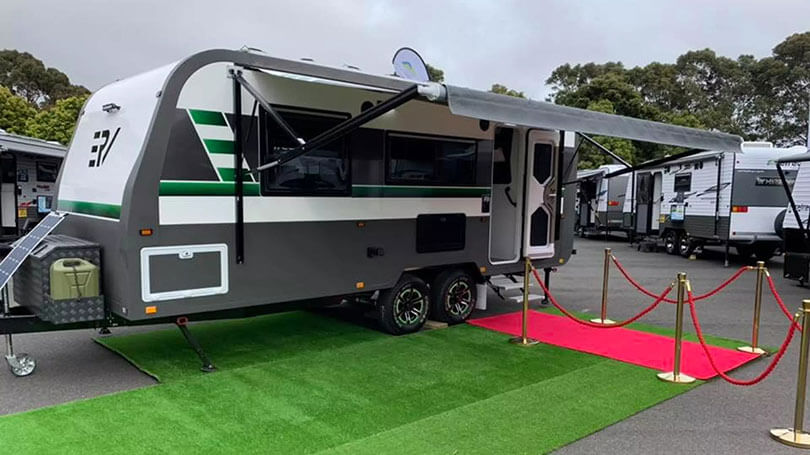The new ERV from Retreat Caravans travels to the most distant corners of Australia and beyond, using only electric power to keep equipment running. That would be a nice feat for an RV as simple as a tiny teardrop trailer, but the ERV is more a dual-axle luxury condo. Its lithium battery and solar roof power the all-season climate control, indoor/outdoor entertainment system, electrified kitchen and even washing machine. Leave the LPG tanks and electrical grid behind, explore Outback-style remoteness and live like a kingly nomad in a high-tech hideaway.
Electric motorhomes and pickup campers have stolen the spotlight throughout 2019, but all-electric caravans have been quietly creeping forward in the backdrop. In the US, Thor Industries, the world’s largest RV manufacturer, worked up a more rigid definition of “off grid” with the Sonic X caravan concept back in March. Later in the year, another brand under the Thor umbrella, Germany’s LMC, followed suit with its own electrified trailer at the Düsseldorf Caravan Salon. The two models were quite distinct, but both shared the same goal: leaving behind every last trace of liquified petroleum gas (LPG) and tying together all onboard equipment with a single electrical architecture.
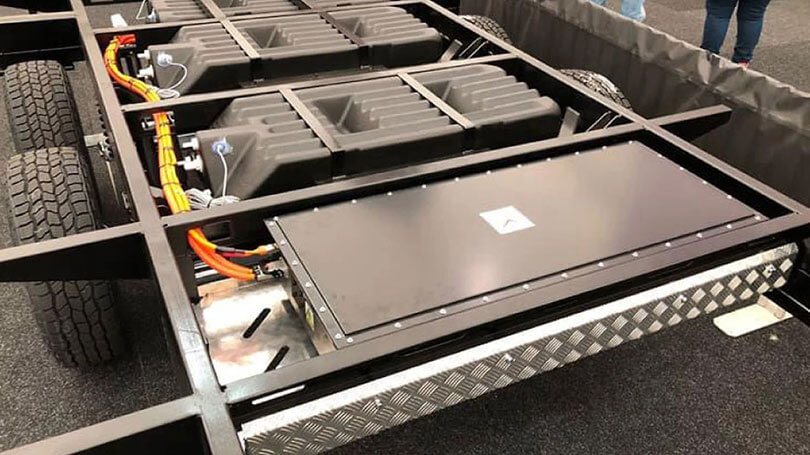
Australia’s Retreat Caravans goes beyond concepts, breaking free from LPG with what it calls the world’s first fully electric caravan, the ERV. It relies on a Centralized Energy Management System (CEMS) supplied by Australian caravan tech startup OzXcorp. Co-founded by Andrew Huett, a businessman who spent nearly two decades living completely off the grid and has racked up some 43,000 miles (70,000 km) traveling around Australia, OzXcorp was formed to bring caravan tech and design into the smart age. With the CEMS, OzXcorp hangs an automotive-grade 14.3-kWh lithium battery pack inside a galvanized steel chassis and distributes power through a 48-volt electrical architecture.
The OzXcorp CEMS mounts the 14.3-kWh lithium battery neatly in the end of the chassis
The CEMS battery has roughly 12 times the kilowatt-hour capacity of the 100-Ah batteries common in RV construction, and Retreat needs every last watt-hour. Resisting any temptation to pare down features to conserve energy, Retreat loads the ERV with a lengthy equipment list that pushes well into glamping territory. That list includes both heating and A/C; a water heater; a washing machine; a comprehensive entertainment system with 24-in smart TV, indoor/outdoor stereo speakers and available outdoor TV; LED lighting; and the aforementioned kitchen with dual-burner induction cooktop, convection oven/grill and 274L standing-height fridge/freezer. For its show trailer, Retreat even accessorizes the kitchen with an electric coffeemaker, kettle and toaster. Outside, there’s a slide-out Weber electric grill and separate 36L fridge freezer. All equipment is powered off the battery, and a CZone smart command center offers full digitized monitoring, control and problem diagnosis.
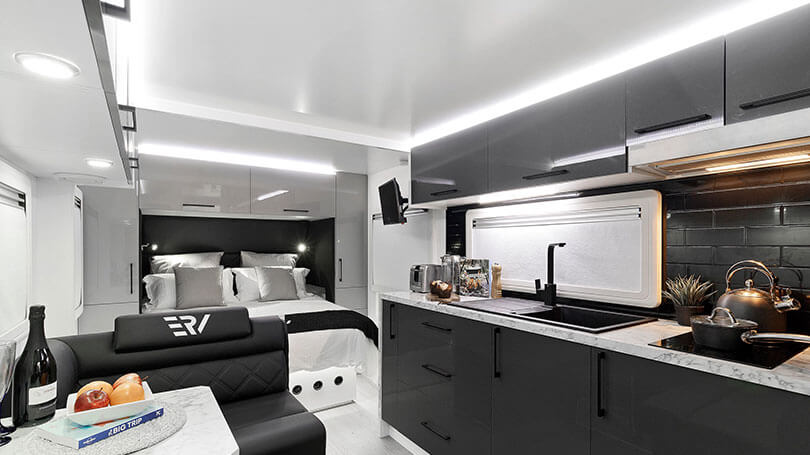
Retreat ERV interior
To shore up efficient energy usage, Retreat relies on a new composite construction with optimized thermal insulation, helping the cabin retain heat in colder weather and cool air in warmer temperatures. The all-electric design in turn streamlines construction, eliminating the need for the exterior venting needed for gas appliances, thereby making it simpler to seal and dust-proof the shell. Eliminating vents that interior air could escape through also improves thermal efficiency.
The ERV’s 5,000-watt inverter can keep multiple appliances and components humming all at once. At shows and events, Retreat demonstrates this capability by dropping bread slices into the toaster, switching the kettle on, firing up the cooktop and blowing the hairdryer, all with the air conditioning running in the background. That sounds more like a weekday work morning than a camp morning, so the ERV shouldn’t have trouble keeping up with a more leisurely holiday routine.
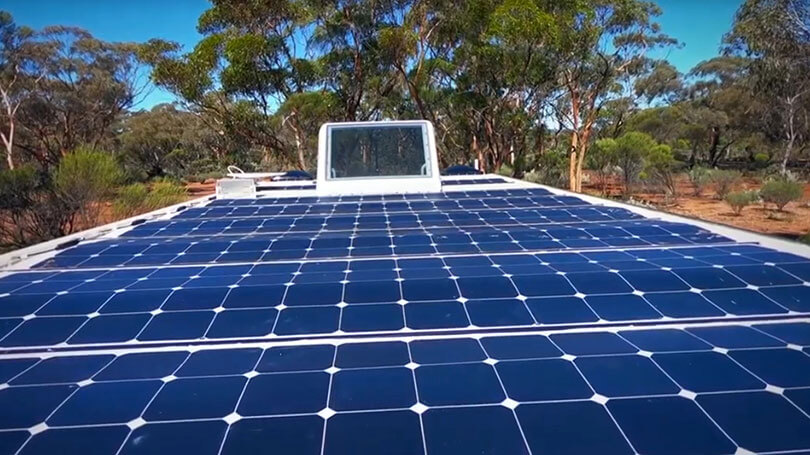
Up to 2,033 watts of solar panels find home on the roof
The ERV does of course include a shore power hook-up for times it’s parked in a fully equipped campground, but it’s really built with off-grid travel and living in mind. It pulls charge from the tow vehicle while driving and includes a robust roof-mounted solar array that packs up to 2,033 watts, depending upon floor plan and overall roof length.
During the prototype phase, Retreat and OzXcorp put the ERV through grueling real-world testing, traveling more than 12,400 miles (20,000 km) through the heart of Australia over six months. The goal was to make the trip relying solely on solar power, keeping the trailer unplugged from both the tow vehicle and all shore power hook-ups. The travelers did have to connect a back-up generator when the battery dropped particularly low during shady conditions, but beyond that, they remained true to the goal of relying on solar power. At one point during the journey, the ERV was even powering its own equipment and two additional caravans.
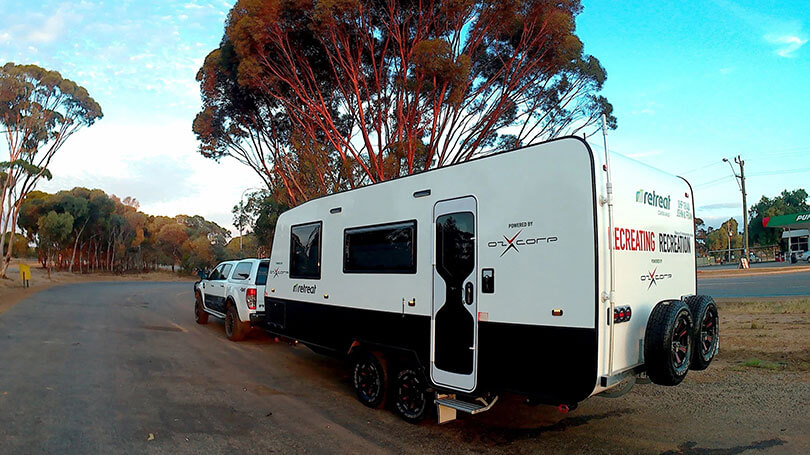
This prototype traveled 12,400 miles around Australia to test out the CEMS electrical system
The ability of ERV buyers to have the same kind of fully unplugged trips will depend upon their power usage and available sun. Even knowing a little about how luxury-laden Australian caravans are, we’re surprised with just how much battery-sapping equipment Retreat has loaded into this one, since it could have easily left off or sized down a few of those components. But we guess the point was to make a strong statement about how campers don’t have to skimp to go electric.
The ERV carries water in an isolated 65L drinking water tank and two additional 110L tanks. The large interior fridge and outdoor auxiliary fridge help ensure travelers have plenty of fresh food on hand when traveling to remote locations.
Retreat debuted a more refined, production-ready ERV at the Melbourne Leisurefest in October and is completing work on the first ERV-1 Off-Road, an 18.6-foot (5.7-m) model. From there, it intends to offer several different floor plans on various length single- and dual-axle trailers. A Cruisemaster TS off-road suspension and Mickey Thompson all-terrain tires will eat up the type of off-grid ground for which the ERV’s impressive electrical underpinnings are engineered.

The ERV will start at $109,900 in Australia
Retreat tells us the ERV will start at AU$109,900 (approx. US$75,625), and we’ll look to publish a more complete breakdown of layouts, standard features, options and prices after the first models push their way out of the production facility. For those interested in doing some power math, Retreat has wattage figures for the various electrical components and accessories listed on the ERV homepage linked below.
The video below dives into the ERV experience with John and Fran Huett, the couple who made the cross-country prototype trip.
Source: New Atlas


